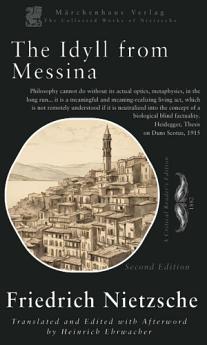The Idyll from Messina: A New Reader's Edition
May 2024 · The Collected Works of Friedrich Nietzsche Book 30 · Marchen Press
Ebook
104
Pages
family_home
Eligible
info
reportRatings and reviews aren’t verified Learn More
About this ebook
"The Idyll from Messina" (German: Idyllen aus Messina) is a collection of poems that showcase Nietzsche's passion for poetry. In these verses, he explores various philosophical themes, including the nature of beauty, the experience of solitude, and the quest for meaning. This collection was composed during Nietzsche's stay in Messina, Italy, and reflects his attempt to express his philosophical ideas through the medium of lyrical poetry. An idyll is a short poem describing rustic life in a romanticized way, written in the style of Theocritus' short pastoral poems, the Idylls. Tolstoy and many other European writers at the time tried to resurrect these ancient styles of writing. This collection was published in Leipzig, Germany, in 1882 by the publishing house E.W. Fritzsch. This is a new 2024 translation from this original 1882 German manuscript containing a new Afterword by the Translator, a timeline of Nietzsche's life and works, an index with descriptions of his core concepts and summaries of his complete body of works. This translation is designed to allow the armchair philosopher to engage deeply with Nietzsche's works without having to be a full-time Academic. The language is modern and clean, with simplified sentence structures and diction to make Nietzsche's complex language and arguments as accessible as possible. This modern critical reader's edition offers a clear and accessible translation of Nietzsche’s original manuscript, using contemporary language and streamlined sentence structures to make his complex ideas easier to engage with. Designed for both general readers and students of philosophy, the edition includes a range of supporting materials to provide context and deepen understanding. These include an afterword by the translator discussing the historical reception and intellectual legacy of the work, an index of key philosophical concepts with emphasis on Existentialism and Phenomenology, a chronological list of Nietzsche’s published works, and a detailed timeline of his life, highlighting the personal relationships that influenced his thinking. Friedrich Nietzsche (1844-1900) was a watershed German philosopher, cultural critic, poet, musician (briefly) and philologist (the study of ancient manuscripts) whose work has had a profound impact on modern intellectual history. Known for his critiques of European morality and religion (particularly Protestantism), Nietzsche's ideas on the "will to power" and the "Übermensch" have influenced a wide range of philosophical, literary, and psychological thought including thinkers such as Martin Heidegger, Albert Camus, Michael Foucault and the entire Postmodern religion.
About the author
Friedrich Nietzsche (1844-1900) was a watershed German philosopher, cultural critic, poet, musician (briefly) and philologist (the study of ancient manuscripts) whose work has had a profound impact on modern intellectual history. Known for his critiques of European morality and religion (particularly Protestantism), Nietzsche's ideas on the "will to power" and the "Übermensch" have influenced a wide range of philosophical, literary, and psychological thought including thinkers such as Martin Heidegger, Albert Camus, Michael Foucault and the entire Postmodern religion.
Rate this ebook
Tell us what you think.
Reading information
Smartphones and tablets
Install the Google Play Books app for Android and iPad/iPhone. It syncs automatically with your account and allows you to read online or offline wherever you are.
Laptops and computers
You can listen to audiobooks purchased on Google Play using your computer's web browser.
eReaders and other devices
To read on e-ink devices like Kobo eReaders, you'll need to download a file and transfer it to your device. Follow the detailed Help Center instructions to transfer the files to supported eReaders.











